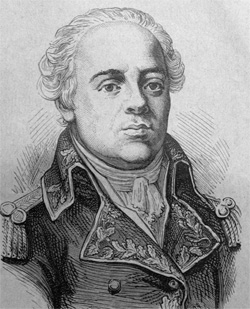General Jacques François de Menou de Boussay

Born: September 3, 1750
Place of Birth: Boussay, Indre-et-Loire, France
Died: August 13, 1810
Place of Death: Villa Corneso, Italy
Arc de Triomphe: MENOU on the south pillar
Pronunciation:
The son of a general, Jacques François Menou would also become a general in time but never really looked the part due to being short, overweight, and balding. He joined the army in 1766 and in 1768 he was commissioned as a sous-lieutenant. Menou's next promotion came in 1774 when he was promoted to capitaine and then in 1787 he was promoted to lieutenant colonel. That year he was also named a Knight of Saint Louis and then in the following year he was promoted to colonel. Though elected as a deputy of the nobility to the Estates General, Menou supported the reform efforts and went on to serve as secretary and later president of the National Constituent Assembly.
In anticipation of a return to the military, in 1792 Menou was promoted to maréchal de camp and assigned to the Army of the North, but he did not join the army, instead staying in Paris and serving in the 17th military division. In May of 1793 he was promoted to général de division and he became the chief of staff to the Army of the Coasts of La Rochelle. Campaigning that summer, he was wounded three times by shots, at Saumur, Vihiers, and Ponts-de-Cé. Authorized to retire because of his wounds, Menou held off on retiring until September of the next year.
Menou's retirement did not last long however. In March of 1795 he returned to active duty. After a brief stint at Amiens and then Lyon, Menou returned to Paris where he disarmed the suburb of Saint-Antoine. That July he was given command of the Army of the Interior, and then in October he was ordered to disarm a royalist movement rising against the government in Paris. General Menou negotiated with the rebels, extracting promises from them to disarm, but when they failed to disarm he was relieved of command and arrested. In the meantime Barras took over Menou's command and General Bonaparte offered his services, resulting in the famous "whiff of grapeshot" of the 13th Vendémiaire that would put down the rebellion and propel Napoleon to greater fame. With the government preserved, Menou was put on trial for his failure to stop the rebellion, but he was acquitted at the end of the month.
Menou did not hold an active command again until he joined the expedition to Egypt in 1798. When Baraguey-d'Hilliers fell ill, Menou was given command of his division. Leading the division in the assault on Alexandria, he was wounded six times and then thrown from the top of the ramparts.1 Later that month he was named the governor of the province of Rosetta. During his tenure as governor, General Menou converted to Islam, taking the name Abdallah, and married a local woman who was the daughter of a bath keeper. The next year he directed the siege of the fort of Abukir after the Battle of Abukir and then he was placed in charge of the provinces of Alexandria, Rosetta, and Bahireh.
When Kléber was assassinated in June of 1800, Menou succeeded him as overall commander of the French presence in Egypt. Menou was known as an excellent administrator but poor with strategy and tactics, having once told Napoleon to consider him a loyal subordinate but not a general.2 His abilities could not compare to Kléber's and he was not up to par for handling the challenges faced by the French army in Egypt. His leadership was questioned by some of his officers, including Reynier who he ordered arrested for insubordination, and Lanusse who criticized his leadership at the Battle of Canope shortly before dying. Menou publicly blamed the loss at Canope on his chief of staff General Damas, and then on May 14th he ordered General Destaing to arrest both Reynier and Damas. Eventually Menou was forced to surrender to the British in Alexandria after a lengthy siege, and he returned to France in the autumn of 1801.
Once back in France, Menou would fulfill administrative positions for the rest of his career. In 1802 he became a member of the Tribunate. Next Menou became the administrator general of Piedmont and later he became a Grand Officer of the Legion of Honor before being placed in charge of the departments from the Alps to Marengo. In 1807 he received a further award, being made a Knight of the Iron Crown, and then in 1808 he became a Count of the Empire and he served as governor general of Tuscany. In 1809 he fulfilled the same position in Venice, and then in 1810 he was authorized to return to France shortly before his death.
Notes
- Robert Richardson, Larrey: Surgeon to Napoleon's Imperial Guard, (London: Quiller Press, 2000), 46.
- John R. Elting, Swords Around a Throne: Napoleon's Grande Armée, (USA: Da Capo Press, 1997), 161.
Bibliography
- Chandler, David G. Dictionary of the Napoleonic Wars. New York: Macmillan Publishing, 1979.
- Haythornthwaite, Philip J. Who Was Who in the Napoleonic Wars. London: Arms & Armour, 1998.
- Six, Georges. Dictionnaire Biographique des Généraux & Amiraux Français de la Révolution et de l'Empire (1792-1814). 2 vols. Paris: Gaston Saffroy, 2003.
Updated May 2025
© Nathan D. Jensen